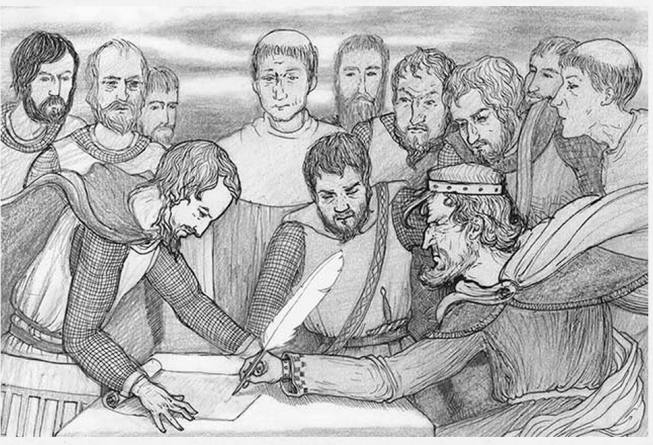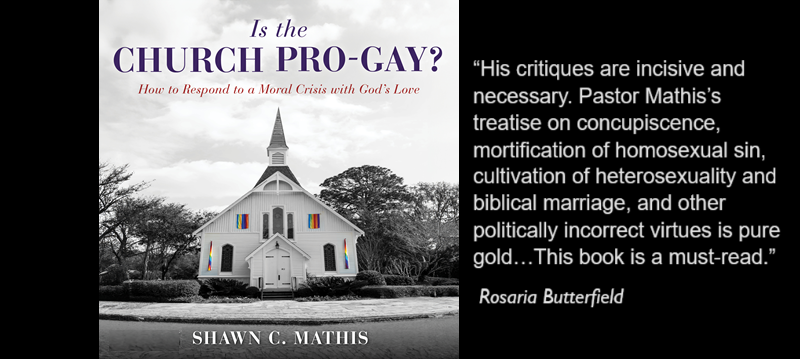
King John forced to sign the Magna Charta, 1215 AD.
Kim Davis’ civil disobedience is part of a long history of Christians who taught or resisted unjust governments and unjust laws: Ambrose, Augustine, Calvin and more.
Many Americans today likely do not associate Christianity with resistance against civil authority, but the practice and doctrine are as old as the history of the bible.
While in Egypt, the nursemaids defied Pharaoh’s order to kill babies. During the time of Judges, Israelite leaders rose up against their local tyrants. Although David fled from King Saul, he took armed men with him and would not submit.
In the New Testament era, the Apostles of Christ famously declared: “We ought to obey God rather than man” (Acts 5:29). The early church martyrs testify to the power of a conscience captivated by God instead of man.
Although the rationale for such acts of defiance is not articulated in one verse of the bible, the Christians fathers believed the Bible spoke to this issue.
From the ancient fathers like Ambrose and Augustine, to leaders of the High Middle Ages (John of Salisbury and Aquinas) and the more well-known Protestant leaders until the time of the American Revolution, there has been a steady witness of Christian leaders ready to stand against tyranny.
It is not just the leaders but the people who followed them. On April 6, 1320 the Declaration of Arbroath was signed as an act of Scottish independence. And various revolutions of the Protestant Reformation were defended upon religious principles of the Bible and natural law, such as the famous Magdeburg Confession.
It was not until the Reformation era and afterward that more rigorous defenses of defiance to civil authority under certain conditions became available. From John Calvin, Theodore Beza and Viret to the post-Reformation legal thinkers such as Althusius and Rutherford, the overwhelming bulk of the defenders of this doctrine were Calvinists.
The commentaries of Peter Martyr and Calvin as well as the Geneva Bible notes commend the proper use of resistance (Ex. 1:19).
Since early America was predominately influenced by the Calvinists, the Puritans in particular, it is not surprising to find that John Adams tied the moral and legal rationales for resistance to England to the Colonists’ socio-religious history in his Defense of the Constitution.
Thus long before the rise of progressivism and modern atheism, Christianity has offered a vigorous practice and long-lasting rationale for resisting bad government and bad laws. Whether one agrees with the legal rationales used by Davis’ lawyers, Kim Davis is in good company.
Listen to a three part series on the biblical basis of resisting tyranny or an in-depth 12 part series, here.
History of the Christian influence upon American legal system, here.
Good intro book on this topic, here.






Kim Davis is a curious case to me. Her marital history i.e three or four times married and possibly adultery and children born out of wedlock as well, provides much “ammunition” for the unconverted to cast in her face. Apparently all these marriages and the other sinful behaviour happened before she was converted. Does that make everything all right? I thought that marriage was given to all mankind i.e saved and unsaved and that the unsaved are as married in God’s eyes as the Christians. She has shown some courage in opposing homosexual “marriage” but it seems she is going back to work in a place where she knows God’s law concerning marriage is being violated i.e “gays” are given marriage licences, so will she turn a blind eye to that as long as her name as Clerk does not appear on the licence? I have opposed the homosexual agenda in Northern Ireland and I have experienced great hostility towards my views. In fact, the Police are investigating comments I made about homosexuals because they may constitute a “hate incident/crime.” This is what we Christians will all have to face eventually i.e police investigations because we will be viewed (or are viewed) as enemies of the State. Having said all this, I still don’t know what to think about the Kim Davis case.
I understand. That is why I was careful in how I wrote my article. Good Christians can disagree. These are dark times. A greater time for the Gospel to shine forth I pray.
I don’t know for sure, but it was brought to my attention that she attends a church that does not believe in the Trinity. That would therefore put her “Christianity” in much doubt, if it is true.
https://twitter.com/droakley1689/status/639933960655470592
https://web.archive.org/web/20141021213309/http://www.solidrockapostolicchurch.org/about-us